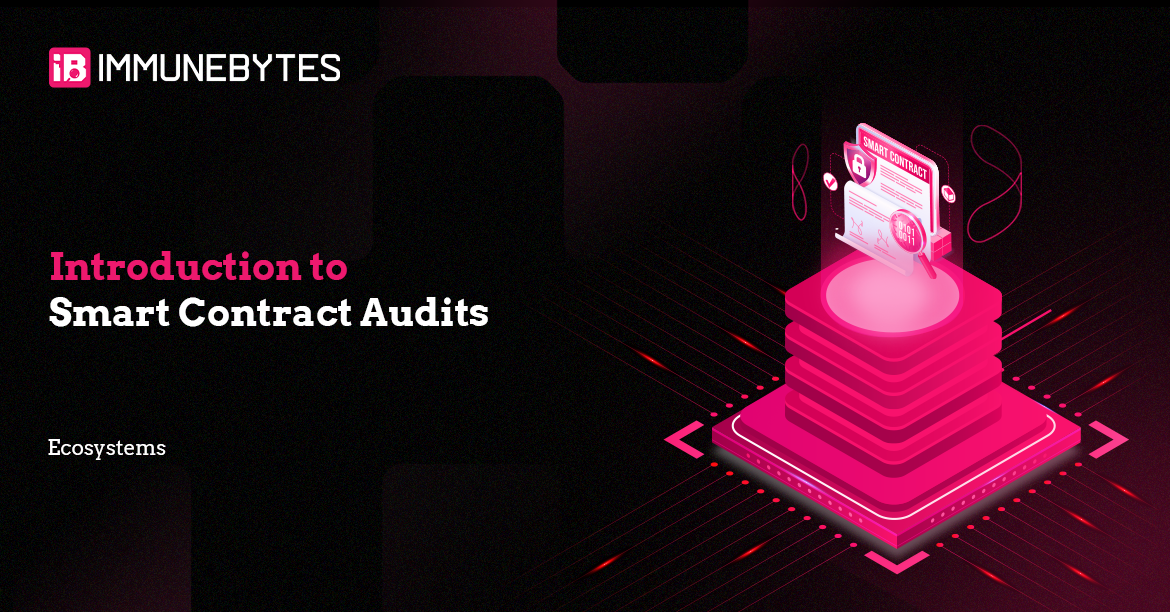Are you aware of the importance of smart contract audits in exposing hidden security vulnerabilities and bugs in smart contracts? Read this blog to the end for an in-depth introduction to smart contract audits!
A smart contract audit is a comprehensive review of the smart contracts included in a blockchain application project. These audits are crucial for companies to safeguard their funds and those of their investors. Due to the immutable nature of blockchains, stolen funds cannot be retrieved. Typically, smart contract audits involve auditors examining the code of smart contracts, producing a report, and providing it to the client for review and action. A final report is then released, documenting any remaining errors and detailing the steps taken to address performance or security issues.
Introduction
Before diving into the details of auditing a smart contract, it is essential to have a basic understanding of smart contracts themselves. Today, smart contracts are at the forefront of blockchain technology. They cater to almost every industry segment with a variety of applications and transactional use cases. In simple terms, a smart contract is a set of programmed agreements consisting of functions and data that execute automatically whenever a network accesses it to process a user-requested transaction.
Smart contract security audits are particularly common in the Decentralized Finance (DeFi) space. While many people have started recognizing the importance of audits, not everyone examines the lines of code closely. If you’re considering investing in a project, we recommend reviewing its smart contract audit report before making a decision.
Let’s dive in to explore the methods, tools, and results typically involved in smart contract security audits to help you make informed decisions.
What is a Smart Contract Audit?
A smart contract security audit is an exhaustive inspection of a blockchain application’s smart contracts to identify and address design flaws, code errors, or security vulnerabilities. The primary focus of an audit is the scrutiny of the code that underpins the terms and conditions of the smart contract. Through audits, developers can uncover vulnerabilities and bugs before deployment.
Security audits are essential for companies handling significant transaction volumes, sometimes reaching billions of dollars.
A professional audit usually involves the following steps:
- Requirement Gathering
- Unit Testing
- Automated Code Analysis
- Manual Code Review
- Report Generation
Security is a major concern for smart contracts. Many decisions hinge on the validity of a project’s audit. Concerns over inefficiencies and security risks can lead to substantial additional costs in implementing upgrades for smart contracts in production on a blockchain network.
How to Audit Smart Contracts
Auditing smart contracts involves evaluating blockchain applications’ smart contracts using various tools and frameworks. The methodology is fairly standardized among audit providers. The typical process includes:
- Project Familiarization: Auditors collaborate with the development team to understand the smart contract’s architecture and intended behavior. Whitepapers and detailed documentation are invaluable in this phase.
- Code Review: Auditors examine the code to understand its design, libraries, and test coverage.
- Automated Analysis: Tools and frameworks like Slither, Foundry, Echidna and Halmos are used to analyze the code and detect potential vulnerabilities.
- Manual Analysis: To address false positives from automated tools, auditors manually review the code, following best practices such as proper code structure, variable naming, and eliminating redundant code.
- Initial Audit Report: Findings and recommendations are compiled into a report for the client’s review.
- Code Fixes: Developers address the issues highlighted in the initial report and resubmit the code for final review or respond against each finding reported by the auditors.
- Final Audit Report: After all fixes, auditors consolidate the findings into a comprehensive report.
How Much Does a Smart Contract Audit Cost?
The cost of a smart contract audit varies based on factors like the size of the smart contract (lines of code) and the estimated engineering hours required. Small audits may cost a few thousand dollars, while larger ones can range up to half a million dollars.
The reputation of the auditor significantly impacts the cost. Higher-quality audits from renowned firms come at a premium and are also a way for better projection of the blockchain protocol.
Why Do You Need a Smart Contract Audit?
Smart contract audits are essential due to the irreversible nature of blockchain technology. An attack can’t be rolled back, and vulnerabilities could result in the loss of user’s funds and associated protocol’s assets.
Smart contract audits are crucial for:
- Better Code Optimization
- Improved Contract Performance
- Enhanced Application Security
- Protection Against Hacks and Thefts
Benefits of Smart Contract Audits
Smart contract audits mitigate risks and enhance the credibility of blockchain projects. Here are the key benefits:
- Avoid Costly Errors: Pre-deployment audits prevent catastrophic vulnerabilities from affecting the network.
- Expert Review: Security professionals provide valuable insights, identifying cognitive and behavioral biases.
- Attract Investors: A security audit enhances investor confidence.
- Easy Integration: Modern tools facilitate seamless integration into diverse development environments.
Concluding Thoughts
Smart contract security audits are a gold standard in the DeFi sector. Even if you lack technical expertise, reading an audit report and understanding the severity of potential risks can guide better investment decisions.
Always consider all factors and take a comprehensive view before making an investment decision. We hope this article has helped you understand the basics of smart contract audits.

